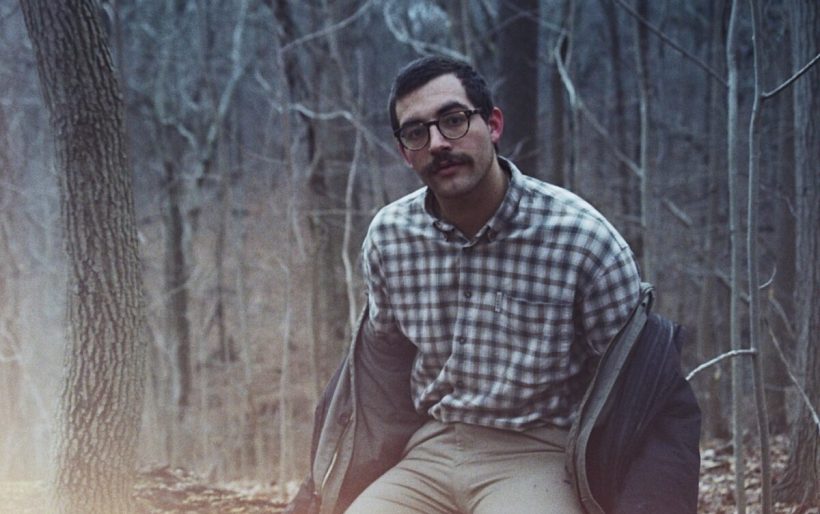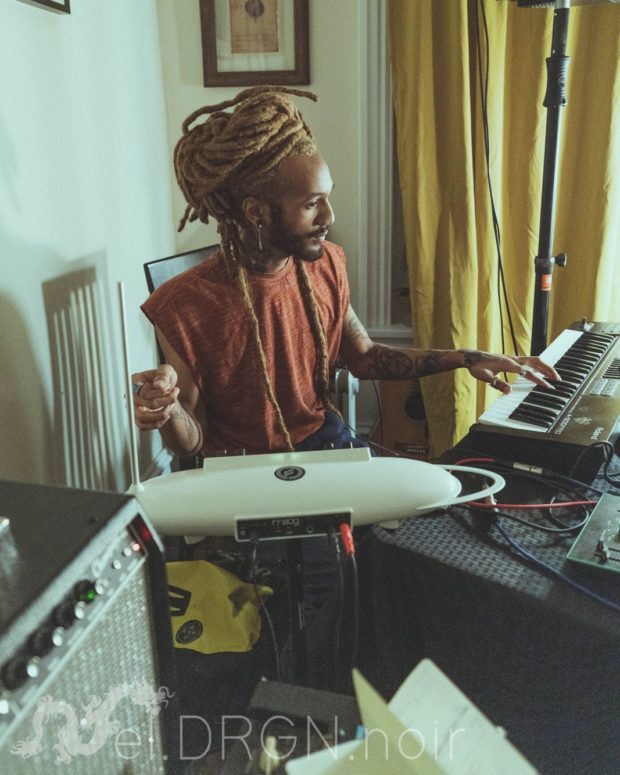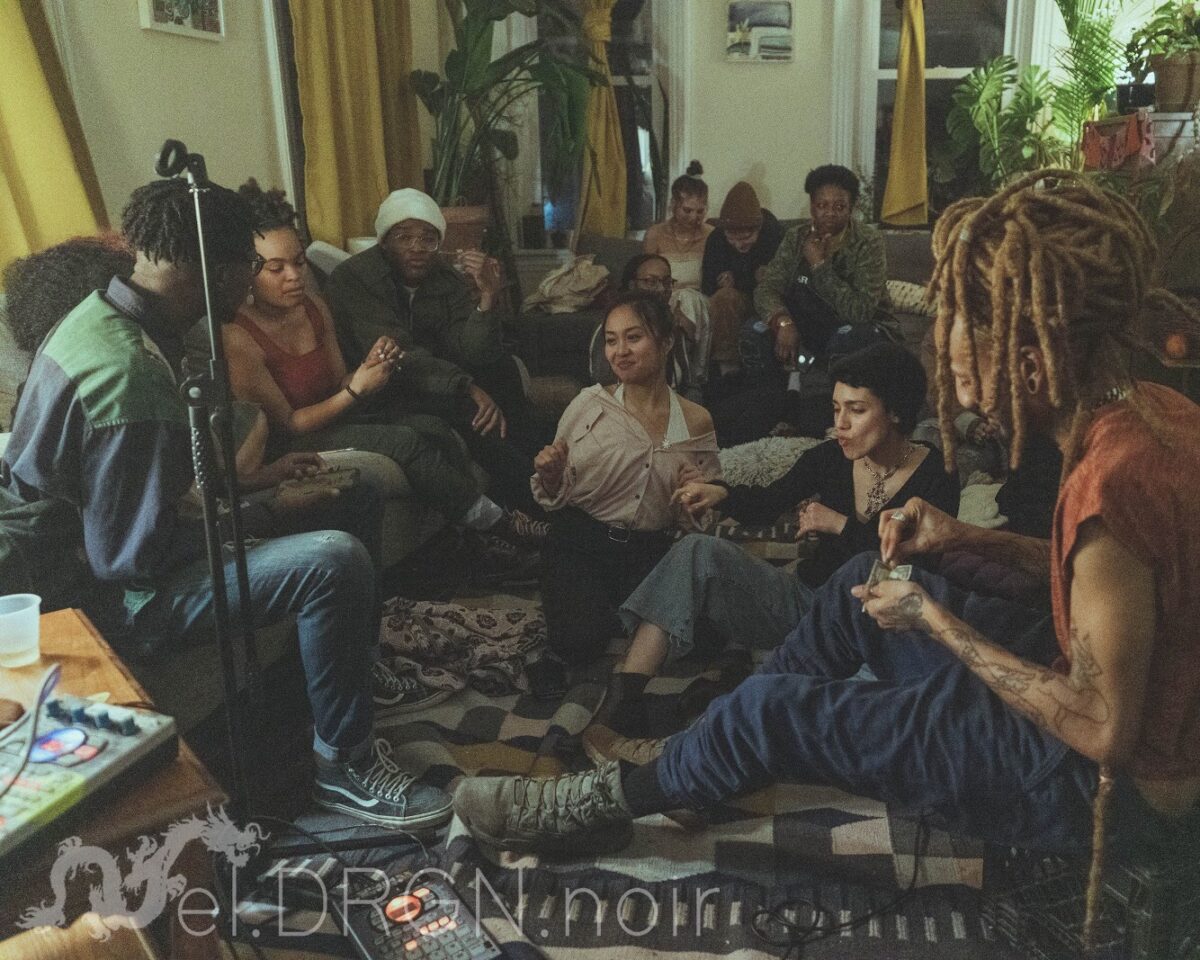
Pablo Maldonado | photo by Mariah Hall
Naked Lunch’s Pablo Maldonado and the transcendence of music
Pablo Maldonado has the makings of a beat poet, with his tortoiseshell glasses, hand-rolled cigarettes and Moleskine journal. His music, released under the moniker Moses Honey, revives the sound of 1960’s psychedelia, pairing electronic melodies with surreal vocal effects, and combining aspects of hip-hop and spoken word.
Although he often performs solo, Maldonado is a part of a larger collaborative group called Naked Lunch, named after the William S. Burroughs novel. Songs revolve around themes of human experience such as love, pleasure, self-evolution, and healing catharsis. Drawing inspiration from beatnik counterculture, the group is more than just a band, functioning as a new art movement that encompasses poetry, visual art and music. Shows happen in casual settings, like living rooms, backyards and basements, adopting an informal and improvisational structure.
A Philly native and former student at Temple University, Maldonado formed community connections through his work with Global Village and Newports and News. We meet in Wissahickon Valley Park on a gloomy February morning. After hiking through dense and muddy woods, we settle on a moss-covered log in a clearing for our interview, lulls punctuated by the distant rush of water and the echo of birdsong.
The Key: How did you get into playing music?
Pablo Maldonado: I started playing music because of my uncle, who plays guitar.
TK: How old were you when you started playing?
PM: I was thirteen when I first picked it up. I took lessons from a teacher in my middle school, and did School of Rock for a little bit. I started recording in high school. I got into my first relationship, and that sparked some creativity. That’s when I became a person.
TK: Well, you suddenly had something to write about. A lot of my poetry revolves around relationships.
PM: I was always a sad kid, and had emotional weight. The necessity to create was always there, but I don’t think I recognized it as a tool until that time. I started making voice memos. It was a mix of love songs and songs about my family, and feeling discontent with my living situation and my relationship with my father.
TK: You felt discontent living with your grandparents?
PM: My grandparents are very old school. They’re focused on respect, and the dynamics of authority, so I didn’t feel I had a voice. I couldn’t be myself. It was nice to lock myself in the basement and record. I started recording with intent after I started college.
TK: Were you recording and playing by yourself?
PM: Always. I was listening to “Out Getting Ribs” by King Krule and trying to learn it. I changed the tuning on my guitar and that set me on the path of making music the way I do now.
TK: Why did you decide to drop out of school?
PM: Going to school for anything outside of music seemed pointless. I loved studying English but it aggravated my mental health. I didn’t love it enough to devote myself the same way I did to my music. I was distracted and it made me a shit student. I needed time off, but I’ll go back to study music eventually, when finances and time permit.
TK: Can you tell me about your internship with Newports and News?
PM: My friend and collaborator Noel introduced me to the Newports crew early in 2019. They operate as a studio and event space, and needed a sound intern to help facilitate things in their beginning stages. My first performances were all at Newports as Moses Honey, and as a member of their house band. Recently they hosted a listening party for my February release.
TK: What exactly is Naked Lunch?
PM: Naked Lunch is a transcendentalist art movement, committed to articulating human experience– moments of transcendence, discovery of self, dissolution of ego, the search for pleasure. It is an imagined universe that contains a physical manifestation of our transcendental philosophies.
TK: Why is transcendence a topic that you return to in your work?
PM: After my first manic episode, this was February of my freshman year, I started writing a book about that idea of transcendence and shedding self. That ultimately became about love and finding self. Really all the music I make is about self-actualization and finding purpose. The manic episode was the first transcendental moment for me, that feeling of leaving my body and entering a new state of being. At the time I was writing more poetry and prose, and taking time off music.
TK: Was there any direction or intention to the book, or were you just writing to express what was going on?
PM: I was writing to capture my mood, because I knew that what had happened was significant. It later became about transcendence. On April 28th I went to my fist Global Village jam. That was my first transcendental moment outside of drug use or mental health. It was a very pure, sober, organic moment. I haven’t had a moment like that since. I was two days away from killing myself, but that experience changed everything and gave me a purpose again. My moods are characterized by depressions more than they are mania. Global was the first realization that music is what I need. Writing never gave me the catharsis, it wasn’t a healing experience, it was just a means for me to understand.
TK: Can you describe the first jam you went to?
PM: I didn’t know what it was. My friend was doing social media for them, and told me I needed to come out. The air was so thick with this energy. I didn’t have any idea about that language– energy, transcendence, intuition, spirituality. It was a very human experience. There were only twenty people there and we just sat in a circle on the floor. Global was just starting, so there was a lot of excitement about just the idea of it. All the creatives there were hungry to share that space. The collective presence was so strong. That was the feeling, of being present. Everything in my life dissolved outside of that. Jams have a structure now, but it wasn’t like that. There was a lot of freestyling and conversation in between, it was like a therapy session. We just passed the mic around, everyone got a chance to express. I had so much to express, and it all poured out of me.

TK: Were you just talking, or singing?
PM: Both. I just had a space to speak. I hadn’t been introduced to the Philadelphia creative scene yet, that was my first taste of it. It was very inspiring. I started working with Global a month later. It gave me something I could be committed to and passionate about. I met Isaiah at the first jam, and connected really well. We locked eyes and I was like, that’s my soul brother. Right away we started talking about music. He was the first person to make me believe I could do it seriously. When I first started releasing music publicly, someone came to me and said that they heard my song, and it completely unblocked them creatively. It made me realize the function of the music outside of myself.
TK: What your music can do for other people?
PM: Right, it had only been a tool for myself, a way to heal. A couple weeks ago, I’m walking down Washington and this car pulls up and someone yells, “Yo, You’re Moses Honey! I love your music!” That’s never happened to me, I’ve never been recognized on the street. It was such a surreal moment.
TK: It was exactly what you needed.
PM: Yeah. I don’t need to be famous. But to achieve what I want to achieve, a following helps with that. The purpose of it is now twofold: it’s not about me. To have any kind of effect on someone is…
TK: It connects you to other people.
PM: But do I really need affirmation in my art to continue?
TK: I think every artist does – to feel like you’re doing what you’re supposed to be doing, and that you should keep going, you need some affirmation.
PM: It’s a relationship I’m building with the people around me. I’m fully devoted to this, I’m going to make music every day, forever. But it does give me something better to work towards, like I’m going to make music for you. If I can help this one person, that’s enough.
TK: Can you tell me about your project where you’re releasing an album every month this year?
PM: The goal of an album per month was a New Year’s resolution. I finished Moses, Honey really quickly. I recognized that I was making music really fast, and had all these songs I didn’t know what to do with. It was also just a challenge to myself, an exercise in practice and charting progress. I wanted to see how my mood and style would evolve over the year. It’s a feat in itself to do twelve albums that are conceptually tied together. After I release all this music, I want to take a year to work on one project.
TK: You’re collaborating with several artists on each album, correct?
PM: Yeah. Isaiah and I started Naked Lunch, and the Moses Honey project is my persona in that universe. We just wanted to build an art monster. In that process we established that we needed room for our own individual content.

TK: What is the origin of your stage name, Moses Honey?
PM: Well there’s that Radiohead album, Pablo Honey. I liked the wordplay. Honey and sweetness are in the realm of pleasure. Like the distinction between the organic moment of transcendence at the jam and the synthetic one, my manic episode– those images of sweetness and pleasure became to what we were making. Moses is my middle name, which I’ve always shrugged away from. But it allows me to establish separation from myself and explore parts of myself that are hidden. When I’m making music, I’m stepping out of the way and letting my soul take over. I’m unconsciously guiding myself. So in the last year it was, talking myself through my breakup and through my journey in trying to figure out my purpose.
TK: How do you think your sound has evolved?
PM: I was recording on my phone for a long time, I had a very minimal set up. My equipment was stolen from my car when I was living in South Philly, so it forced me to use the phone. I’m not a perfectionist, I like releasing music that I’m not fully okay with. But I wanted to curate more, so I cleansed everything and removed all my music from the internet.
TK: Do you think you’ll stay in Philly and keep making music here, or move somewhere else?
PM: This is my home. I need to establish myself here first, but I’ll definitely leave.
TK: I have that same feeling – I don’t know when, but someday I’m going. Philly is a great place get started and meet other artists, though.
PM: I love it here. All the people I’ve met through Global or Newports have been instrumental in me achieving this goal. I can’t make 150 songs without collaboration. I love working with people. Found sound, and capturing the essence of people and their space, that has become a part of the music making process. It’s been rewarding and life-changing, lessons of patience, trust and presence. Its such a space to grapple with anxiety and self-doubt.
TK: If you had to pin your music into a particular genre, what would it be?
PM: It’s… lo-fi electronic indie mixed with hip-hop and all these other influences. It changes. It’s love music.
TK: That’s a topic you always return to, love.
PM: Love is universal.
TK: But it’s not always romantic love.
PM: I talk about self-love and the role of love and pleasure in my life. My relationships with myself, friends, partner, family. The language is ambiguous to the point I could be talking about all of them. It’s always about love.